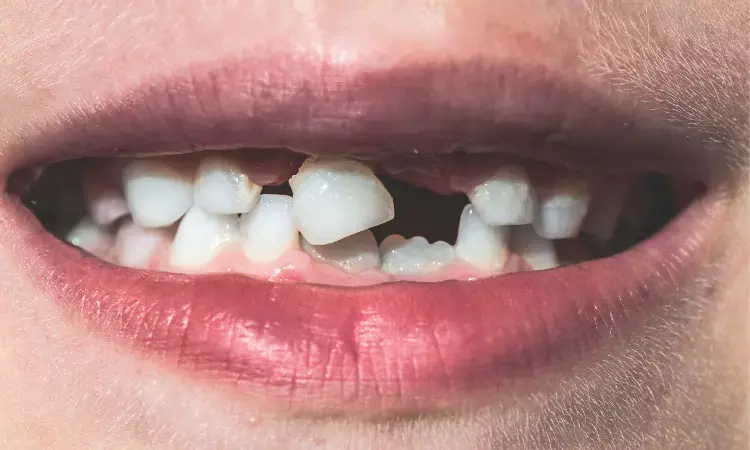- Home
- Medical news & Guidelines
- Anesthesiology
- Cardiology and CTVS
- Critical Care
- Dentistry
- Dermatology
- Diabetes and Endocrinology
- ENT
- Gastroenterology
- Medicine
- Nephrology
- Neurology
- Obstretics-Gynaecology
- Oncology
- Ophthalmology
- Orthopaedics
- Pediatrics-Neonatology
- Psychiatry
- Pulmonology
- Radiology
- Surgery
- Urology
- Laboratory Medicine
- Diet
- Nursing
- Paramedical
- Physiotherapy
- Health news
- Fact Check
- Bone Health Fact Check
- Brain Health Fact Check
- Cancer Related Fact Check
- Child Care Fact Check
- Dental and oral health fact check
- Diabetes and metabolic health fact check
- Diet and Nutrition Fact Check
- Eye and ENT Care Fact Check
- Fitness fact check
- Gut health fact check
- Heart health fact check
- Kidney health fact check
- Medical education fact check
- Men's health fact check
- Respiratory fact check
- Skin and hair care fact check
- Vaccine and Immunization fact check
- Women's health fact check
- AYUSH
- State News
- Andaman and Nicobar Islands
- Andhra Pradesh
- Arunachal Pradesh
- Assam
- Bihar
- Chandigarh
- Chattisgarh
- Dadra and Nagar Haveli
- Daman and Diu
- Delhi
- Goa
- Gujarat
- Haryana
- Himachal Pradesh
- Jammu & Kashmir
- Jharkhand
- Karnataka
- Kerala
- Ladakh
- Lakshadweep
- Madhya Pradesh
- Maharashtra
- Manipur
- Meghalaya
- Mizoram
- Nagaland
- Odisha
- Puducherry
- Punjab
- Rajasthan
- Sikkim
- Tamil Nadu
- Telangana
- Tripura
- Uttar Pradesh
- Uttrakhand
- West Bengal
- Medical Education
- Industry
Severe mental illness patients more likely to lose all their teeth because of poor dental care

People with severe mental illnesses are falling through the cracks when it comes to oral health care, according to new research.
The study explores the reasons why people with severe mental illness-such as Schizophrenia and bipolar disorder-struggle to maintain good oral health and access dental care, leaving them three times more likely than the general population to lose all their teeth.
The research found a lack of integration of oral, mental and physical health care services and lack of tailored support for accessing dental care to be contributing factors. The study highlights the need for mental health care staff to provide support for good oral health. Dental care providers would also benefit from training to increase their knowledge of the needs of people with severe mental illness, the research suggests.
Availability of care was flagged by the study as a major issue with recent reports suggesting as many as nine out of ten NHS dental practices in England are now closed to new routine patients.
Lead author of the study Dr Masuma Mishu from the Department of Health Sciences at the University of York, said: "People with severe mental illness have poorer oral health compared to those without mental illness and untreated tooth decay is a common cause of non-psychiatric hospital admissions for this group. Our study addresses the urgent need to understand the reasons behind these oral health inequalities."
Co-author of the study, Professor Lina Gega from the Department of Health Sciences at the University of York, added: "During a mental health crisis, physical health can be overshadowed; this includes oral health which can lead to long-term dental problems, pain and oral disease.
"We are calling for oral health to be incorporated into care planning for those experiencing severe mental health problems. Offering support such as organised accompanied visits to the dentist can help alleviate anxieties and overcome practical barriers around dental check-ups and treatment."
The qualitative study involved seven participants with severe mental health conditions. A further ten participants were healthcare professionals including dentists, carers, mental health nurses and doctors.
Participants in the study also identified costs as a key barrier to accessing dental care.
To read the full article, click on the following link:
Dr Kamal Kant Kohli-MBBS, DTCD- a chest specialist with more than 30 years of practice and a flair for writing clinical articles, Dr Kamal Kant Kohli joined Medical Dialogues as a Chief Editor of Medical News. Besides writing articles, as an editor, he proofreads and verifies all the medical content published on Medical Dialogues including those coming from journals, studies,medical conferences,guidelines etc. Email: drkohli@medicaldialogues.in. Contact no. 011-43720751


